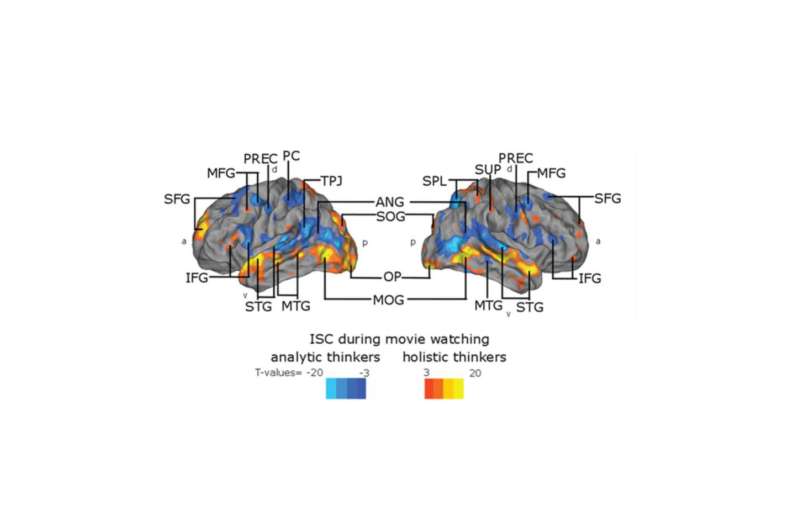How you respond to drama depends on if you are a holistic or analytical thinker

Magnetic resonance imaging (MRI) scans of people watching the same clip from a dramatic film show that holistic thinkers all have similar brain responses to the scene, whereas analytical thinkers respond differently to each other.
Aalto University researchers showed volunteers the film My Sister's Keeper on a screen while the research subjects were monitored in an MRI scanner. The study compared the volunteers' brain activity, and concluded that holistic thinkers saw the film more similarly with each other than analytical thinkers. In addition, holistic thinkers processed the film's moral issues and factual connections within the film more similarly with each other than the analytical thinkers.
Before conducting the MRI scan, the 26 persons participating in the research were divided into holistic and analytical thinkers on the basis of a previously established evaluation survey. According to previous studies, analytical thinkers pay attention to objects and persons while looking at photographs, whereas holistic thinkers consider also the background and context.
"Holistic thinkers showed more similarities in extensive areas of the cerebral cortex than analytical thinkers. This suggests that holistic thinkers perceive a film more similarly with each other than analytical thinkers," says Professor Iiro Jääskeläinen.
Significantly more similarity was observed in holistic thinkers in the parts of the brain generally related to moral processing—in the occipital, prefrontal and anterior parts of the temporal cortices. This suggests the holistic thinkers processed the moral questions of My Sister's Keeper in a similar way to one another. The anterior parts of the temporal lobes, however, process meanings of words.
Analytical thinkers showed similarities mainly in the sensory and auditory parts of the brain. They listen to the dialogue literally, whilst holistic thinkers perceive the meanings through the context and their own interpretation of the film's narrative.
"It was surprising to find so many large differences in so many cerebral areas between the groups," Professor Jääskeläinen said. "Analytical and holistic thinkers clearly see the world and events in very different ways. On the basis of the visual cortex, it can still be concluded that holistic thinkers follow the film scenes more similarly, whereas analytical thinkers are more individual and focus more on details."
So far, research dealing with analytical and holistic views has focused on cultural differences between the east and west: more analytical thinking has been detected in western cultures, and more holistic thinking in eastern cultures. Now the study was carried out within one culture and, for the first time, as a film study.
"The research can help people understand the way other people observe the world. A holistic thinker may find it frustrating that an analytical thinker interprets things literally, sticks to details and does not see the big picture or context. An analytical thinker may, on the other hand, see the holistic thinker as a superstitious person, who believes in long causal links, such as the butterfly effect."
More information: Mareike Bacha-Trams et al, A drama movie activates brains of holistic and analytical thinkers differentially, Social Cognitive and Affective Neuroscience (2018). DOI: 10.1093/scan/nsy099
Mareike Bacha-Trams et al. Differential inter-subject correlation of brain activity when kinship is a variable in moral dilemma, Scientific Reports (2017). DOI: 10.1038/s41598-017-14323-x
















